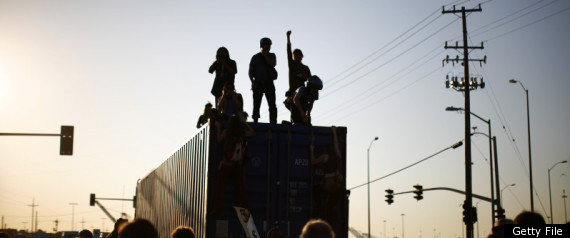 OAKLAND, Calif. (Reuters / December 11) - Anti-Wall Street protesters, hoping to briefly cripple a key supply chain of American commerce and re-energize their movement, plan to attempt to block major West Coast ports Monday.
OAKLAND, Calif. (Reuters / December 11) - Anti-Wall Street protesters, hoping to briefly cripple a key supply chain of American commerce and re-energize their movement, plan to attempt to block major West Coast ports Monday.By marching on U.S. ports from California to Alaska, organizers look to call attention to economic inequalities in the country and a financial system they complain is unfairly tilted toward the wealthy.
The planned action comes after the Occupy Wall Street movement that began in New York in September has seen its tent camps in most big West Coast cities dismantled in police raids, leaving the movement looking for new avenues to voice its discontent.
But a plan to shutter multiple ports simultaneously could prove difficult because some of the facilities are in massive complexes with multiple entrances that would be tough to fully block, even if large numbers of demonstrators turn out.
Activists aligned with the Occupy Wall Street movement did briefly succeed in shuttering Oakland's port, the fifth busiest in the country, for hours on Nov. 2 after police kept their distance.
Oakland, long an Occupy hot spot, may again be center stage Monday in a day of protest seen as a test of the movement's momentum, along with the combined ports of Los Angeles and Long Beach. Organizers are also targeting Portland, Anchorage, Seattle, Tacoma and Houston.
"The objective of the day is to shut down the port through mass action,'' said Mike King, a graduate student who acts as a media liaison for Occupy Oakland. ``The Occupy movement is attacking the 1 percent at their point of profit.''
Police in several cities were so far not disclosing their plans for handling the protesters or whether they aimed to confront them, risking clashes, or stand back.
FOCUS ON TRUCK DRIVERS
The Port of Oakland has mounted a public relations campaign to dissuade protesters from joining the effort, while two of the largest labor unions involved have split -- with the International Longshore and Warehouse Union opposed to the blockade and Teamsters in favor.
But union workers were largely expected to stay on the job, and were contractually barred from joining such a strike. The protest will focus in part on truck drivers who earn low wages and cannot join unions because they are classified as independent truck drivers, and must provide their own trucks.
"It's a group that encapsulates basically everything that is wrong with society,'' King said.
Among the companies at which protesters directed their ire was SSA Marine, which loads and unloads cargo ships. Organizers said they planned to target its terminal at the combined ports of Los Angeles-Long Beach, which together handle 40 percent of the nation's waterborne imports.
"They are independent contractors,'' SSA Marine spokesman Bob Watters said of the nonunion drivers. Truckers provide their own vehicles and the lease agreements are day by day, he said, allowing them to work for many companies.
Oakland port spokesman Isaac Kos-Read said the issue of independent truckers was being adjudicated in court, and that the port was working with unions and its tenants to improve the environmental impact of trucking.
"The port empathizes with the issues brought up by the Occupy movement,'' he said. "But we have a strategy for inclusive development. Shutting down the port is only going to hurt the people they are trying to help.''
(Reporting By Laird Harrison. Additional reporting by Teresa Carson in Portland, R.T. Watson in Los Angeles, Karen Brooks in Houston and Laura L. Myers in Seattle; Writing by Dan Whitcomb, Editing by Sandra Maler)
Origin
Source: Huff
No comments:
Post a Comment